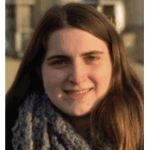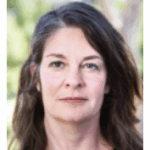HRDAG Answers Human Rights Questions on Large Scale
Maria Gargiulo earned a Bachelor of Science degree in statistics and data science and Spanish literature from Yale University in 2019. She conducted field research on intimate partner violence in Nicaragua and was a data science fellow at the US Census Bureau. She’s also an avid tea drinker.
As the communications hub at HRDAG since 2013, Christine Grillo manages editorial content for the organization. She is also a science writer whose work has appeared in such publications as The Atlantic, Audubon, and The New York Times. She has taught creative writing and English composition at universities in Baltimore and New York, and she teaches workshops at the Johns Hopkins Bloomberg School of Public Health to assist scientists in communicating more effectively.
There are so many ways data science can provide answers to questions about how to effect positive change in the world. As the organization’s name suggests, the Human Rights Data Analysis Group (HRDAG) uses data science to answer questions about human rights on a large scale, from determining chain of command and accountability in international cases of genocide to evaluating whether artificial intelligence–based tools used by the US criminal justice system are fair.
HRDAG was born in 1991, when its database analysis identified the 100 worst officers in the Salvadoran military during that country’s civil war. As part of the peace process, and thanks to the organization’s data analysis, those officers were forced to resign. Fast forward to Guatemala in 2013: HRDAG’s expert analysis was used in the trial of Gen. José Efraín Ríos Montt, who was found guilty of genocide in his own country. Fast forward again to Senegal in 2015, where HRDAG expert analysis helped a panel of judges decide on a verdict for Chad’s former leader, Hissene Habré, finding him guilty of crimes against humanity, war crimes, and torture. He was sentenced to life in prison.
Expert testimony is not the whole story of HRDAG, however. Supporting the Humanitarian Law Centre, the organization’s researchers evaluated and collaborated on the center’s Kosovo Memory Book to commemorate people who were killed or disappeared in relation to the armed conflict. An ongoing project in Syria involves working with the UN and several local partners to deduplicate data and arrive at scientifically rigorous casualty enumerations, as well as a project to complete a rigorous and scientifically sound estimate of casualties.
And not all of HRDAG’s work revolves around war. Some of the organization’s most recent projects delve into the global coronavirus pandemic. As will likely be the case for years to come, most of the available data sets on the COVID-19 crisis are incomplete and unrepresentative, creating a great deal of uncertainty in what is known about the virus and the disease. But making sense of imperfect data sets is at the heart of what HRDAG does. So far, the organization has published two articles in Granta about the virus—the first about case fatality rates and the second about how to interpret antibody tests. The organization’s researchers have also published articles in Significance—about the models used to estimate infection rates and the susceptible, infectious, and removed model used by epidemiologists—as well as a paper about a framework for modeling the number of cases using only mortality data.
HRDAG has also been involved for many years in statistical analysis that can inform our conversations and thinking about the US criminal justice system. In 2016, its work was represented in a Granta article about homicides committed by police, estimating one third of all Americans killed by strangers are killed by police. This past summer, during a national uprising sparked by the murder of George Floyd by police, Granta refreshed that article with a new introduction.
Other work by HRDAG has involved evaluations of predictive policing tools that rely on artificial intelligence and pre-trial risk assessment tools that use existing data. Consistently, HRDAG has found that instead of cleansing the justice system of human biases, these tools perpetuate and exacerbate unfairness that’s been baked into the system—and its data sets—by decades of unjust policing practices.
But HRDAG is not content to simply do the data science. This team believes its most important mission is to grow the field of data scientists who work at the intersection of statistics and human rights. To that end, the organization prioritizes training new scientists in the field through internship and mentorship programs onsite at their office in San Francisco. A year ago, HRDAG invited Valentina Rozo Ángel, a researcher at Colombian human rights NGO Dejustica, to collaborate as a visiting analyst. Through her work with HRDAG, Ángel was an author of a report estimating the number of social movement leaders killed in 2016 and 2017 in Colombia. After finishing her time at HRDAG, Ángel took a position as a data scientist at the Truth Commission in Colombia and uses the skills she developed at HRDAG to study the impacts of conflict on Colombian society and contribute to the truth and reconciliation process.
Another HRDAG success story in growing the field is hiring statistician Maria Gargiulo early this year. She got to know the HRDAG team in 2018 when she worked there as an intern. Her experience taught her she doesn’t have to choose between dedicating her career to statistics and social issues. That summer, Gargiulo learned it’s possible to innovate ways to use statistics to support advocacy and positive change in the world, and when she was hired in February, she was able to hit the ground running.
The COVID-19 crisis, criminal justice system bias, and human rights abuses may stay with us for a while, but HRDAG is using data science to help colleagues and lay persons understand what’s happening and what it means. They supply the evidence for evidence-based policies that have the power to make the world fairer and support accountability and justice for all.



















